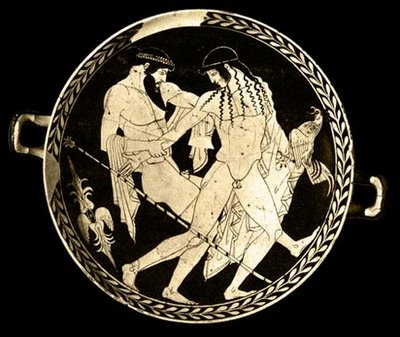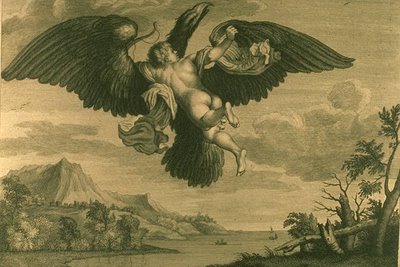
Costak and Lefteri Kaptan as Ganymede[1] and Zeus. The slaying of Lefteri kaptan adds another 'killing of the missing father' angle to the story.
[1]Ganymede
Trojan youth taken by Zeus as his cup-bearer (and lover), from Greek Ganymedes, perhaps a non-Greek name, or from ganymai "I rejoice, am glad" (related to ganos "brightness; sheen; gladness, joy; pride") + medea (plural) "counsels, plans, cunning" (see Medea); taken in Greek folk-etymology to mean "delighting in genitals." Used figuratively of serving-boys (c. 1600) and catamites (1590s). Associated with Aquarius in the zodiac. As the name of one of the four large satellites of Jupiter, by 1847.
catamite (n.)
"boy used in pederasty," 1590s, from Latin
Catamitus, corruption of Ganymedes, the name of the beloved cup-bearer of
Jupiter (see Ganymede). Cicero used it as a contemptuous insult against
Antonius.

Ganymede by Mia Gibson
Ganymede is the young, beautiful boy that became one of Zeus' lovers. One source of the myth says that Zeus fell in love with Ganymede when he spotted him herding his flock on Mount Ida. Zeus then came down in the form of an eagle or sent an eagle to carry Ganymede to Mount Olympus where Ganymede became cupbearer to the gods. According to other accounts, Eos kidnapped Ganymede, to be her lover, at the same time she kidnapped Tithonus. Zeus then robbed Eos of Ganymede, in return granting Eos the wish that Tithonus be immortal. Unthinkingly, Eos forgot to ask that Tithonus remain youthful. Everyday, the faithful Eos watched over Tithonus, until one day she locked him in a room and left him to get old by himself.
Upon hearing that Ganymede was to be cup bearer as well as Zeus' lover, the infinitely jealous Hera was outraged. Therefor Zeus set Ganymede's image among the stars as the constellation Aquarius, the water carrier. Aquarius was originally the Egyptian god over the Nile. The Egyptian god poured water not wine from a flagon.
All of Zeus' scandalous liaisons have allegorical meanings. Some sources say that Zeus' affair with Ganymede was a (religious) justification for homosexuality within the Greek culture, yet others state that this is merely a reflection of Greek life at that time. Before the popularity of the Zeus and Ganymede myth spread, however, the only toleration for sodomy was an external form of goddess worship. Cybele's male devotees tried to achieve unity with her by castrating themselves and dressing like women.
Apollodorus argued that this myth emphasized the victory of patriarchy over matriarchy. This showed that men did not need women to exist, therefor they did not need the attentions of women. The philosopher Plato used this myth to justify his sexual feelings towards male pupils.
